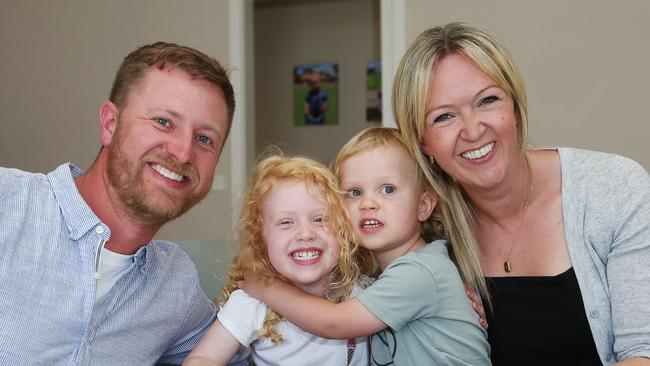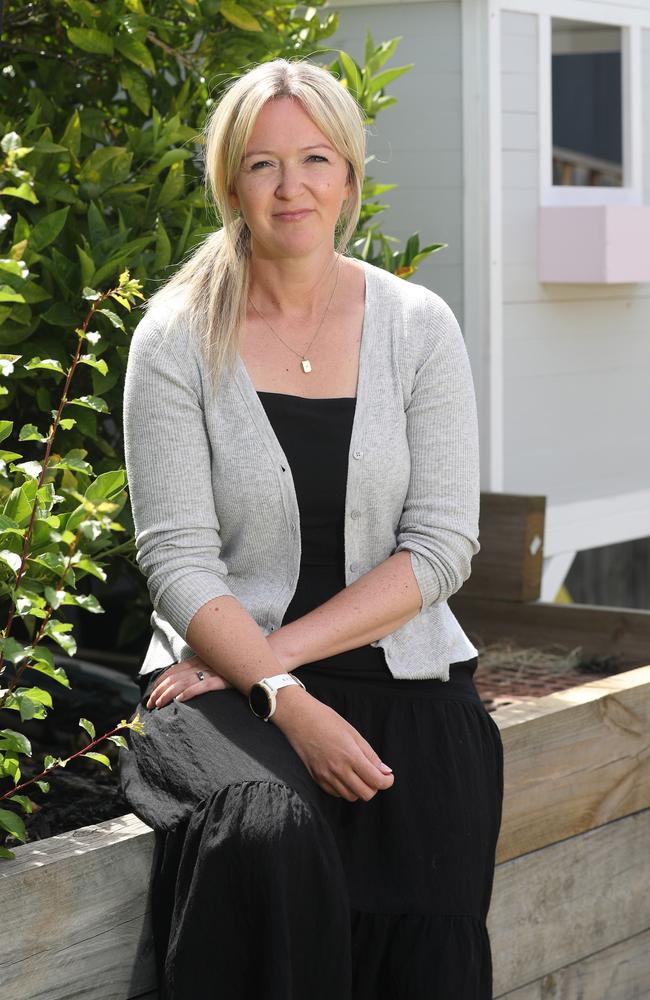Kate McGechan shares heart attack story for REDFEB
An otherwise healthy Highton mum has told of the “terrifying” heart attack she experienced while home alone with her two young kids, as alarming findings highlight the risk for women.

Geelong
Don't miss out on the headlines from Geelong. Followed categories will be added to My News.
An otherwise healthy Highton mum has told of the “terrifying” heart attack she experienced while home alone with her two young kids.
Kate McGechan’s husband had just left for a work trip and she was preparing for the day in early February last year when she began to feel sick.
“I felt quite nauseous,” the 40-year-old said.
“I started feeling faint and had the onset of a tight chest.
“The pain kept getting worse.”
Mrs McGechan was concerned she might pass out and was worried for her kids, then aged one and three.
She phoned her husband, who called an ambulance and a friend who came to help.
The chest pain was becoming “unbearable” and Mrs McGechan also experienced tingling down her arms.
With no known risk factors or family history of heart disease, she initially thought she may have suffered a panic attack.

An ambulance took Mrs McGechan to Geelong hospital where blood tests indicated heart issues.
She remained in hospital for four nights, and an MRI confirmed she had experienced a heart attack.
Her husband rushed back from the airport on the morning of the episode.
Mrs McGechan said she was diagnosed with “myocardial infarction with non-obstructive coronary arteries” (MINOCA) – meaning there was no blockage to the arteries.
She underwent rehabilitation with a multidisciplinary team and now takes preventive medicine.
Mrs McGechan is able to continue to live an active life, and said she was particularly mindful of her health following the scare.
She warned other women to be vigilant about their health and listen to their bodies.
Heart Research Australia is raising awareness about the under-diagnosis and under-treatment of women with heart disease.
The organisation is also encouraging people to wear red and donate this month, which is REDFEB — heart awareness month.
Dr Monique Watts, a heart failure cardiologist and specialist in women’s heart disease who works at Melbourne hospitals, said: “We’ve found over recent years that women are doing worse after their heart attacks, they’re more likely to have another heart attack, and more likely to die or have heart failure than men within the five years following their heart attack.”
She said “the very clear and specific risk factors for women” were not well-publicised.
“Early menopause, inflammatory conditions such as rheumatoid arthritis and lupus, and complications during pregnancy – such as pre-eclampsia, hypertension, and gestational diabetes – are all important risk factors for women,” she said.
Nicci Dent, chief executive of Heart Research Australia, said while traditionally heart disease had been viewed as a bloke’s disease, globally it was number one killer of women.
“Many women don’t experience the crushing chest pain that is a classic symptom of a heart attack in men,” Ms Dent said.
“Some feel extremely tired or short of breath.
“Other atypical symptoms include nausea and abdominal, neck, and shoulder pain.”
For more information on REDFEB and heart health, visit: www.heartresearch.com.au
More Coverage
Originally published as Kate McGechan shares heart attack story for REDFEB






